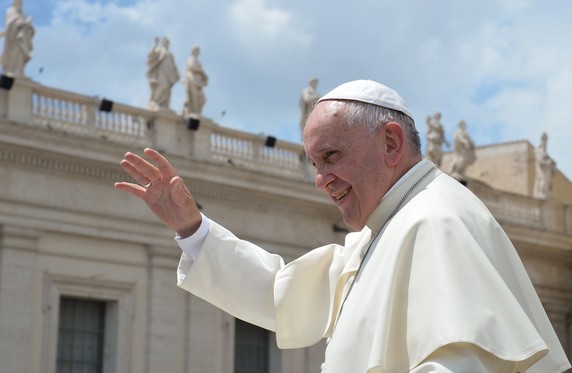VATICAN CITY — He warns of synthetic agrotoxins harming birds and insects and bioaccumulation from industrial waste. He calls for renewable fuel subsidies and maximum energy efficiency. And although he offers prayers at the beginning and end of his heavily anticipated missive on the environment, Pope Francis unmasks himself not only as a very green pontiff, but also as a total policy wonk.

In the 192-page paper released Thursday, Francis lays out the argument for a new partnership between science and religion to combat human-driven climate change — a position bringing him immediately into conflict with skeptics, whom he chides for their denial.
Francis urges taking public transit, carpooling, planting trees, turning off unnecessary lights, recycling — and boycotting certain products.
He called for an ecological conversion for the faithful.
It must be said that some committed and prayerful Christians, with the excuse of realism and pragmatism, tend to ridicule expressions of concern for the environment, he writes.
A highly accurate draft, which leaked Monday in the Italian press, was already dividing politicians and theologians, sparking a debate over the proper role of a pope that was already popping up on the presidential campaign trail in the United States. Environmental activists immediately cheered the rise of an unlikely ally in the fight against climate change, one whose voice could resonate not only in major global conferences but also in prayer groups and church pews.
What effect that the document — known as an encyclical — would have wasn’t clear. Polls show Francis, leader of the world’s largest faith community, is one of the most trusted, popular and retweeted people on the planet. Yet the encyclical comes at a time when institutional religion’s influence is waning in many parts of the world. The last encyclical that most Catholics and non-Catholics could probably name was Humanae Vitae, which reaffirmed the ban on artificial contraception in the 1960s.
Nevertheless, green activists held out hope that the pope’s message would touch religious skeptics of climate change — particularly those who are Catholic. In the document, a reforming pope who has set a new tone for the Church on issues including homosexuality laid out a green view of faith that embraced the moral imperatives of everything from animal rights to solar panels.
And he backed up his science with Bible verse, largely rejecting the notion that man had dominion over the Earth.
He is giving us a moral legitimacy to continue campaigning, said a jubilant Giuseppe Onufrio, executive director of Greepeace in Italy who was set to join a June 28 march in St. Peter’s Square in support of the pope’s environmental stance. Climate change is now an issue of social justice.
In the document, Francis linked global warming to the overarching theme of his papacy — fighting inequality and global poverty. The earth, our home, is beginning to look more and more like an immense pile of filth, Francis wrote, blaming a toxic cocktail of overconsumption, consumerism, dependence on fossil fuels and the errant indifference of the powerful and wealthy. He described a hell on Earth should nothing be done, one filled with more methane and carbon dioxide, acidification of oceans and the crippling of the global food supply.
He has committed his papacy to being a champion of the poor, and the Global South, and he sees the earth as the poorest of the poor. … He sees himself as speaking on behalf of the developing world, and lending his voice to their cause, said the Rev. Matt Malone, president and editor in chief of the Catholic news group America Media.
John Carr, a longtime top policy advisor to the U.S. bishops on issues including the environment, agreed.
We have had a battle between powerful interest groups on environmental issues for a long time. The missing voices have been the poor and the vulnerable. You turn the page and it always starts with, how does this affect the weakest and the most vulnerable. That’s not where the Senate finance committee or the U.N. start, Carr said of the document.
At a news conference Thursday unveiling the document, one of the pope’s top advisors for the encyclical compared humans’ treatment of the earth to that of the disenfranchised.
Our sister, mistreated and pillaged and abused is lamenting and its groans join all those of all the world who are forsaken and uninvited, said Cardinal Peter Kodwo Appiah Turkson, leader of the church’s Council for Justice and Peace.
The pope, who has a secondary school technical degree in chemistry and worked early on as a chemist, also made an unprecedented papal dive into policy detail — for example, assessing carbon credits as unlikely to reduce the overall emission of polluting gases.
For a document timed ahead of several major conferences aimed at forging a broad new global treaty on climate change, Francis also sought to wield his influence to shape a fair deal for the developing world. He called for a binding international treaty that would have rich countries help poorer ones adapt, including a move to help them switch from fossil fuels to clean energies such as solar power.
[Reaction to papal encyclical ranges from over -the-top enthusiasm to hrash dismissal]
Climate change represents one of the principal challenges facing humanity in our day, the pope wrote. Its worst impact will probably be felt by developing countries in coming decades.
Encyclicals, from the Greek ‘kyklos,’ meaning a circle, are essentially circulated letters, or teachings, from popes to the church. This is Francis’s second encyclical since he took office in March 2013. The first, Lumen Fidei (The Light of Faith) was actually the completion of one started by Pope Benedict, about evangelization.
But this one is surprising on many levels, not least of all because in it Francis takes the deepest dive of any previous pope into the issue of climate change. Francis cited the words of both his processors, Benedict XVI and John Paul II, both of whom issued statements of alarm on the environment. But none of them went as deep or as far as Francis did on Thursday.
The encyclical reads in many places almost like a scientific document, speaking of the bioaccumulation of chemicals in the bodies of organisms and concerns about methane seeping into the atmosphere from the Arctic tundra. It is sort of a combination between Saint Augustine and a National Academy of Sciences report.
The passages on climate change, which will draw some of the most attention, go far beyond an affirmation of the consensus view of science that it is caused by humans. It is clear that the pope and his advisers have dug deeply into the issue and discourse confidently about problems such as ocean acidification and polar melt.
Although climate has been the central focus in the document, it is truly about the environment more broadly — our common home, as the text puts it in multiple passages — and also lays out problems related to water security, air quality, species loss and deforestation.
The pope criticizes pressure from the West to impose reproductive health polices on the developing world, but he also acknowledges that unequal distribution of the population and of available resources creates obstacles to development and sustainable use of the environment.
When considering sustainable development, he writes, we need also to think of containing growth by setting some reasonable limits and even retracing our steps before it is too late.
The document was partly drafted with the input of the Vatican’s Pontifical Academy of Sciences, a decades-old body that includes leading academics and scientists from various faiths, including atheists and agnostics such as Stephen Hawking. The pope’s stark warnings sparked derision and dismissal from conservative skeptics. Jeb Bush, a longtime Catholic convert, quipped Tuesday during a stop in New Hampshire that I don’t get economic policy from my bishops or my cardinal or my pope.
On his radio show Tuesday, conservative commentator Rush Limbaugh said, Essentially what this papal encyclical is saying is that every Catholic should vote for the Democrat Party. How else do you interpret it when the pope comes out and sounds like Al Gore on global warming and climate change?
This is a big deal, and it’s ironic that a pope is being criticized by some for accepting science, said the Rev. Thomas Reese, a senior analyst with the National Catholic Reporter. Galileo must be rolling over in his grave.
The document also veers beyond pure science and seeks to connect the dots between religious doctrine and the world. Francis dives into gender, writing that humans must have power over their bodies before they can have power over creation.
Traditional Catholics emphasized that Francis called for accepting one’s own body and gender at birth as part of living in harmony with the Earth. Learning to accept our body, to care for it and to respect its fullest meaning, is an essential element for human ecology, Francis writes. Also, valuing one’s own body in its femininity or masculinity is necessary if I am going to be able to recognize myself in an encounter with someone who is different.
The pope will expand the language typically used to describe human-Earth relations,said Willis Jenkins, a University of Virginia religious studies professor who writes on climate issues.
Changing language on dominion and speaking so intimately and equally about the rights of nature would be deep changes for the ecological imagination of the encyclical tradition and of mainstream Christianity more broadly.
In the big picture, Laudato Si, or Be Praised (or Praised Be,) was a poetic effort, theologians said, to emphasize a reading of the Bible that sees humans as the Earth’s relatives or partners — not her dominators. Francis chose the name for the encyclical from a famous 13th-century prayer that refers to Sister Moon and Brother Sun.
The widespread belief that God gave humans power over the Earth is not a correct interpretation of the Bible, said the National Catholic Reporter in one of the more extensive English translations of the draft.
Bill McKibben, the influential environmental activist and writer, said the draft showed that the pope was positing a bottom line: environmental degradation is leading to climate change that is harming the poor.
The people who have done the least to cause this suffer the most. That should, if nothing else, give weight to the argument that the [Northern hemisphere] must shift serious resources to the poor world, he said.
David Cloutier, a theologian at Mount St. Mary’s, a Catholic university, said the pope was placing potential environmental disaster into a moral context, along with consumerism, lack of action and a disregard for what traditional Catholicism would see as basic gender and family norms.
Pope Francis is helping people understand that environmental commitment is part of being Catholic, Cloutier said. Oftentimes we just seem to be arguing about whether this is a problem at all. I’m hopeful the strong language will push people toward, ‘This is a problem, now what are the best solutions to the problem?’
He calls for global regulatory norms to prevent unacceptable actions — such as when powerful companies dump contaminated waste or offshore polluting industries in other countries.
But he also acknowledges the difficulty of achieving broad consensus, writing that the Church does not presume to settle scientific questions or to replace politics. But I am concerned to encourage an honest and open debate so that particular interests or ideologies will not prejudice the common good.
Sarah Pulliam Bailey, Stefano Pitrelli and Pietro Lombardi contributed to this report.





